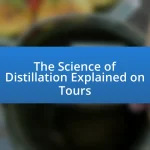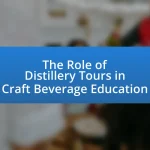The article focuses on the top distillery tours available in your region, highlighting notable options such as local whiskey, craft gin, and rum distilleries. It provides guidance on selecting the best tours by evaluating factors like reviews, distillery reputation, and the quality of experiences offered. The article also discusses the various types of tours, including guided and self-guided options, specialty tastings, and family-friendly activities, while emphasizing the importance of engaging with knowledgeable staff for a richer experience. Additionally, it outlines practical tips for booking tours, finding discounts, and the best times to visit distilleries, ensuring readers are well-informed for their distillery exploration.
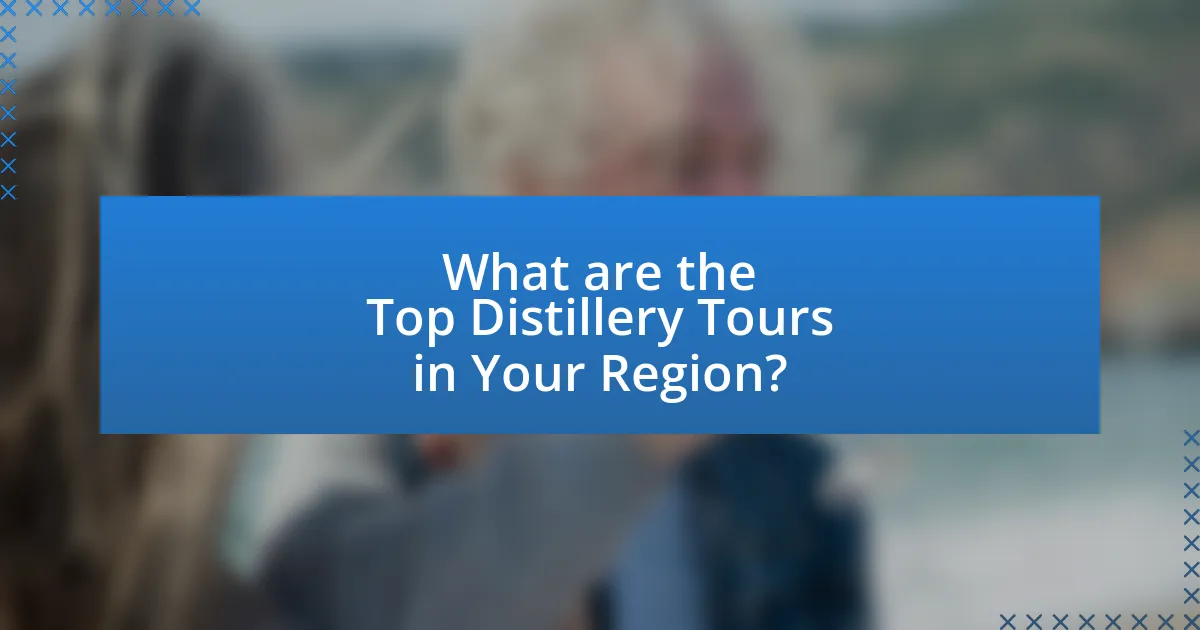
What are the Top Distillery Tours in Your Region?
The top distillery tours in your region include the local whiskey distillery known for its award-winning bourbon, the craft gin distillery that offers unique botanical experiences, and the rum distillery famous for its traditional production methods. These distilleries provide guided tours that showcase their production processes, history, and tasting sessions. For example, the whiskey distillery has won multiple gold medals at international spirits competitions, validating its reputation.
How do you choose the best distillery tours available?
To choose the best distillery tours available, evaluate factors such as tour reviews, distillery reputation, and the quality of the experience offered. Reviews on platforms like TripAdvisor or Yelp provide insights into visitor satisfaction, while a distillery’s reputation can be assessed through its history and awards, such as those from the San Francisco World Spirits Competition. Additionally, consider the tour’s inclusivity of tastings, educational content, and unique experiences, as these elements significantly enhance the overall enjoyment and value of the tour.
What factors should you consider when selecting a distillery tour?
When selecting a distillery tour, consider the distillery’s reputation, the quality of the spirits produced, and the expertise of the guides. A distillery with a strong reputation often indicates a commitment to quality and authenticity, which enhances the overall experience. The quality of the spirits can be assessed through awards and reviews, providing insight into what you can expect during the tour. Additionally, knowledgeable guides can offer valuable insights into the distillation process, history, and tasting notes, enriching your understanding and enjoyment of the spirits.
How do reviews and ratings influence your choice?
Reviews and ratings significantly influence choice by providing social proof and insights into the quality of experiences. Consumers often rely on the aggregated opinions of others to gauge the reliability and enjoyment of distillery tours, as evidenced by a study from BrightLocal which found that 91% of consumers read online reviews before making a purchase decision. High ratings can enhance trust and encourage bookings, while negative reviews can deter potential customers, highlighting the importance of reputation in the decision-making process.
What types of distillery tours can you find in your region?
In my region, you can find several types of distillery tours, including guided tours, tasting experiences, and educational workshops. Guided tours typically provide an overview of the distillation process, showcasing the equipment and techniques used. Tasting experiences allow visitors to sample various spirits produced on-site, often paired with food. Educational workshops offer hands-on learning about the craft of distilling, sometimes including opportunities to create a custom spirit. These tours cater to different interests, from casual enthusiasts to those seeking in-depth knowledge about distillation.
What are the differences between guided and self-guided tours?
Guided tours involve a knowledgeable leader who provides information and context throughout the experience, while self-guided tours allow individuals to explore at their own pace without a guide. Guided tours typically include structured itineraries, expert insights, and often group interactions, enhancing the educational aspect. In contrast, self-guided tours offer flexibility, enabling participants to choose their route and timing, which can lead to a more personalized experience. The choice between the two depends on personal preferences for structure versus autonomy in exploring distilleries.
How do specialty tours, like whiskey or gin tastings, vary?
Specialty tours, such as whiskey or gin tastings, vary primarily in their focus on the specific type of spirit, the production methods highlighted, and the tasting experiences offered. Whiskey tastings often emphasize the aging process, regional characteristics, and flavor profiles unique to different distilleries, while gin tastings may focus on botanical ingredients, distillation techniques, and cocktail pairings. For instance, a whiskey tour might include a visit to a barrel room and discussions on the impact of wood on flavor, whereas a gin tour could feature a hands-on session where participants create their own gin blends. These variations cater to different interests and preferences, enhancing the overall experience for participants.
Why are distillery tours popular among locals and tourists?
Distillery tours are popular among locals and tourists because they offer an immersive experience into the craft of spirit production. Visitors gain insight into the distillation process, learn about the history and culture of the region’s spirits, and often enjoy tastings that highlight unique flavors. According to the Distilled Spirits Council, the craft distilling industry has seen significant growth, with over 2,000 distilleries operating in the United States as of 2021, indicating a rising interest in local and artisanal products. This trend attracts both residents and travelers seeking authentic experiences and connections to local heritage.
What unique experiences do distillery tours offer?
Distillery tours offer unique experiences such as guided tastings, behind-the-scenes access to the production process, and opportunities to learn about the history and craftsmanship of spirits. Participants engage with knowledgeable guides who provide insights into the distillation methods, ingredient sourcing, and aging processes. Many distilleries also feature exclusive tastings of limited-edition or small-batch products, enhancing the experience with unique flavor profiles. Additionally, some tours include interactive elements, such as blending workshops or cocktail-making classes, allowing visitors to create their own drinks. These experiences are designed to deepen appreciation for the art of distilling and provide a memorable, immersive encounter with local culture and traditions.
How do distillery tours contribute to local culture and economy?
Distillery tours significantly contribute to local culture and economy by attracting tourism and promoting regional heritage. These tours provide visitors with insights into traditional distillation processes, local ingredients, and the history of the area, thereby fostering a sense of community identity. According to the Distilled Spirits Council, the spirits industry supports over 1.7 million jobs and contributes approximately $27 billion in revenue to local economies in the United States alone. Additionally, distillery tours often lead to increased spending in surrounding businesses, such as restaurants and hotels, further enhancing economic growth.
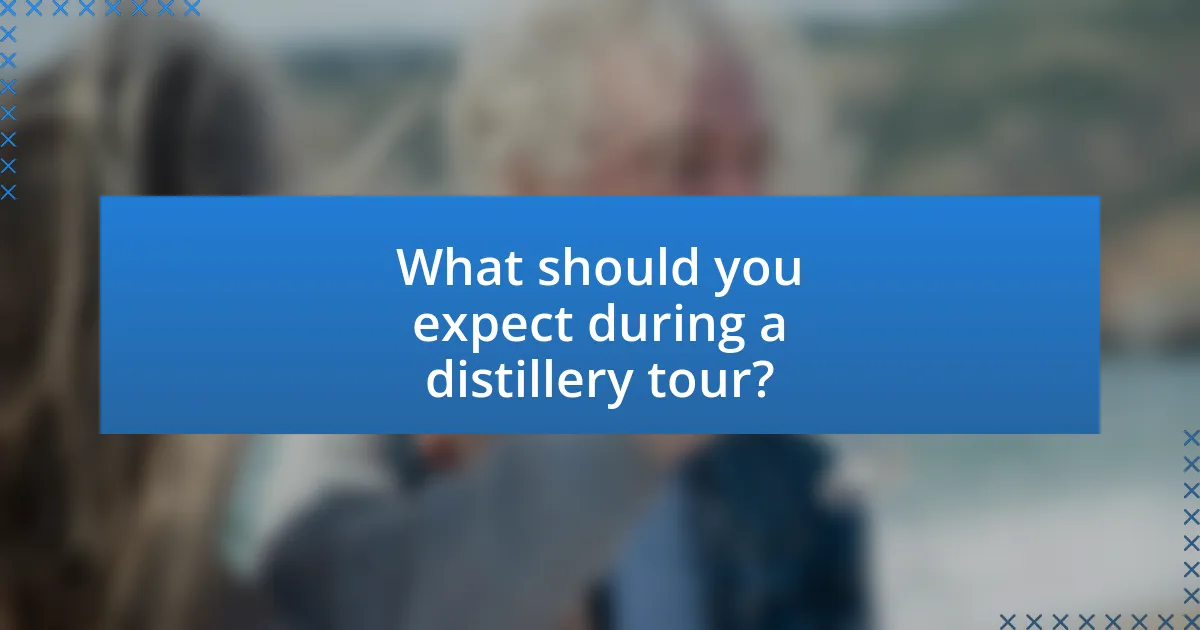
What should you expect during a distillery tour?
During a distillery tour, visitors can expect a guided experience that includes an overview of the distillation process, insights into the ingredients used, and a tour of the production facilities. Typically, the tour will showcase the equipment, such as stills and fermentation tanks, and may include explanations of the aging process for spirits. Many distilleries also offer tastings of their products, allowing guests to sample different spirits and learn about their flavor profiles. This structured experience is designed to educate participants about the craft of distillation and the unique characteristics of the distillery’s offerings.
How long do distillery tours typically last?
Distillery tours typically last between one to two hours. This duration allows visitors to explore the distillation process, learn about the history of the distillery, and often includes tastings of the products. Many distilleries design their tours to fit within this timeframe to ensure a comprehensive yet engaging experience for guests.
What activities are usually included in a standard distillery tour?
A standard distillery tour typically includes a guided walkthrough of the distillation process, showcasing equipment such as stills and fermentation tanks. Visitors often observe the production stages, from mashing to bottling, and may participate in tastings of various spirits produced on-site. Additionally, many tours provide insights into the history and heritage of the distillery, including the ingredients used and the unique methods employed. These activities are designed to educate guests about the craft of distillation and enhance their appreciation for the spirits.
What should you wear or bring for a distillery tour?
For a distillery tour, wear comfortable, casual clothing and closed-toe shoes. Comfortable attire is essential as tours often involve walking and standing for extended periods. Closed-toe shoes are necessary for safety, especially in areas where equipment is present. Additionally, bringing a water bottle is advisable to stay hydrated during the tour, as tastings can be dehydrating.
What are the common features of distillery tours in your region?
Common features of distillery tours in the region include guided tastings, educational sessions about the distillation process, and opportunities to explore the facilities. Guided tastings typically showcase a selection of spirits produced on-site, allowing visitors to sample various flavors and styles. Educational sessions often cover the history of the distillery, the ingredients used, and the techniques employed in production, enhancing the visitor’s understanding of the craft. Additionally, tours frequently include a walkthrough of the production area, where guests can observe equipment and learn about the fermentation and aging processes. These features collectively provide a comprehensive experience that highlights the uniqueness of local distilling traditions.
How do distillery tours incorporate tastings and education?
Distillery tours incorporate tastings and education by providing visitors with hands-on experiences that enhance their understanding of the distillation process and the products being offered. During these tours, participants typically sample various spirits, which allows them to directly connect the flavors and aromas to the ingredients and techniques discussed by knowledgeable guides. For instance, many distilleries explain the fermentation and aging processes while offering tastings of different aged spirits, illustrating how these factors influence taste. This combination of sensory experience and informative dialogue fosters a deeper appreciation for the craft of distillation and the unique characteristics of each spirit.
What amenities can you expect at the distillery?
At the distillery, you can expect amenities such as guided tours, tasting rooms, and retail shops. Guided tours provide insights into the distillation process and the history of the distillery, while tasting rooms offer samples of various spirits produced on-site. Retail shops typically sell the distillery’s products, merchandise, and sometimes local artisan goods, enhancing the visitor experience.
How can you enhance your distillery tour experience?
To enhance your distillery tour experience, actively engage with the distillery staff by asking questions about the production process and the history of the distillery. Engaging with knowledgeable staff can provide deeper insights and enrich your understanding of the craft. Additionally, participating in tastings and taking notes on the flavors can help you appreciate the nuances of different spirits. Research shows that interactive experiences, such as guided tastings, significantly increase visitor satisfaction and retention of information.
What tips can help you make the most of your visit?
To make the most of your visit to distilleries, plan your tour in advance by researching the distilleries you want to visit and their tour schedules. Many distilleries offer guided tours that provide insights into their production processes, and booking in advance ensures you secure a spot, especially during peak seasons. Additionally, consider visiting during weekdays when crowds are typically smaller, allowing for a more personalized experience. Engaging with the staff and asking questions during the tour can enhance your understanding and enjoyment of the distillation process. Lastly, take advantage of tasting sessions to sample different products, as this can deepen your appreciation for the craft and help you discover new favorites.
How can you engage with the distillery staff for a richer experience?
To engage with the distillery staff for a richer experience, actively participate in tastings and ask specific questions about the distillation process and flavor profiles. Engaging in conversations about the history of the distillery and the staff’s personal experiences can enhance your understanding and appreciation of the products. Research indicates that interactive experiences, such as asking for recommendations or insights into unique production methods, lead to a more memorable visit, as staff members often enjoy sharing their knowledge and passion.
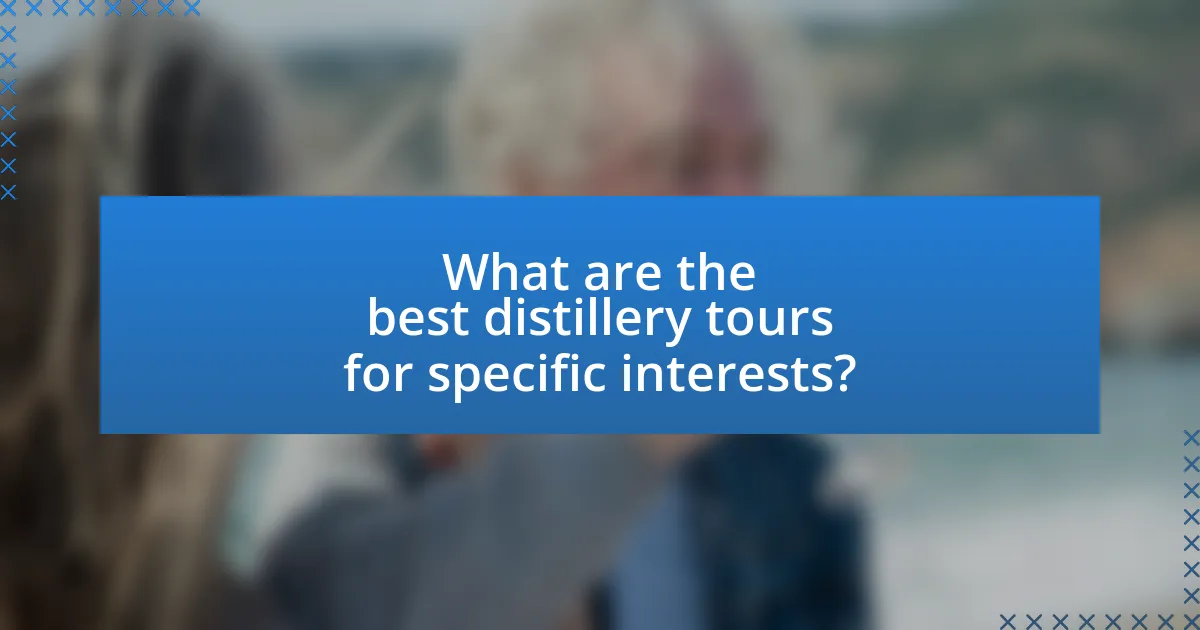
What are the best distillery tours for specific interests?
The best distillery tours for specific interests include craft distillery tours for artisanal spirits, historical distillery tours for those interested in the heritage of distillation, and whiskey tasting tours for connoisseurs. Craft distillery tours often focus on small-batch production methods and unique flavor profiles, showcasing local ingredients and innovative techniques. Historical distillery tours provide insights into the evolution of distillation practices, often featuring vintage equipment and storytelling about the region’s distilling past. Whiskey tasting tours typically offer guided tastings of various whiskey styles, educating participants on flavor notes, production processes, and food pairings. These tours cater to diverse interests, ensuring an engaging experience for all types of enthusiasts.
Which distillery tours are best for beginners?
The best distillery tours for beginners are those that offer comprehensive introductions to the distillation process, such as the Glenfiddich Distillery Tour and the Jack Daniel’s Distillery Tour. These tours provide guided experiences that include detailed explanations of the production methods, tastings of various spirits, and insights into the history of the distillery. For instance, Glenfiddich offers a beginner-friendly tour that covers the basics of whisky making, while Jack Daniel’s provides an accessible overview of Tennessee whiskey production. Both tours are designed to engage newcomers and enhance their understanding of distillation in an enjoyable manner.
What introductory tours are recommended for first-time visitors?
Recommended introductory tours for first-time visitors include guided distillery tours that provide an overview of the distillation process, tastings of various spirits, and insights into the history of the distillery. These tours typically last between one to two hours and often feature interactive elements, such as demonstrations of the distillation process and opportunities to ask questions. For example, many distilleries offer a “Beginner’s Tour” that covers the basics of whiskey production, including ingredients, fermentation, and aging, making it ideal for newcomers.
How do beginner tours differ from advanced options?
Beginner tours focus on fundamental aspects of distillation and production, while advanced options delve into intricate techniques and specialized knowledge. Beginner tours typically include basic information about the distillation process, tasting sessions of a limited selection of spirits, and an overview of the distillery’s history. In contrast, advanced tours often feature in-depth discussions on fermentation, aging processes, and may include tastings of rare or limited-edition spirits, providing a more comprehensive understanding of the craft. This distinction is evident in the varying levels of engagement and expertise required, with advanced tours catering to enthusiasts seeking a deeper appreciation of distillation.
What are the top-rated distillery tours for enthusiasts?
The top-rated distillery tours for enthusiasts include the Kentucky Bourbon Trail, which features renowned distilleries like Maker’s Mark and Woodford Reserve, offering immersive experiences and tastings. Another highly regarded option is the Scotch Whisky Experience in Edinburgh, where visitors can explore the history of Scotch whisky and enjoy guided tastings. Additionally, the Napa Valley Distillery in California provides unique craft spirit experiences, showcasing local production methods. These tours are celebrated for their educational value and quality of offerings, making them favorites among distillery enthusiasts.
Which tours offer exclusive tastings or behind-the-scenes access?
Tours that offer exclusive tastings or behind-the-scenes access include the Distillery Experience Tour at the local craft distillery, which provides a guided walkthrough of the production process along with tastings of limited-edition spirits. Additionally, the VIP Distillery Tour at the regional whiskey distillery grants participants access to private tasting rooms and the opportunity to sample rare releases directly from the barrel. These tours are designed to enhance the visitor experience by providing unique insights into the distillation process and exclusive product offerings.
How do expert-led tours enhance the learning experience?
Expert-led tours enhance the learning experience by providing in-depth knowledge and context that enriches the subject matter. These tours often feature guides with specialized expertise, such as distillers or historians, who share insights that are not readily available through standard educational materials. For instance, a study by the American Association of Museums found that guided tours significantly improve retention of information, with participants recalling 50% more facts compared to self-guided experiences. This interactive engagement fosters a deeper understanding of the distillation process, local history, and cultural significance, making the learning experience more memorable and impactful.
What are the family-friendly distillery tour options?
Family-friendly distillery tour options include those that offer interactive experiences suitable for all ages, such as educational tours that explain the distillation process without alcohol tastings. Many distilleries provide activities like guided tours with engaging storytelling, non-alcoholic beverage tastings, and opportunities for children to participate in hands-on experiences, such as crafting or learning about local ingredients. For example, some distilleries have designated areas for children and family-friendly events, ensuring a welcoming environment for visitors of all ages.
How do distilleries accommodate families with children?
Distilleries accommodate families with children by offering family-friendly activities and amenities. Many distilleries provide non-alcoholic beverages, such as sodas or juices, and have designated areas for children to play. Some locations offer guided tours that include educational components suitable for all ages, ensuring that children can learn about the distillation process in an engaging way. Additionally, certain distilleries host events or festivals that feature activities like crafts or games specifically designed for children, making the experience enjoyable for the entire family.
What activities are available for kids during the tour?
During the tour, kids can engage in activities such as interactive educational sessions, scavenger hunts, and craft workshops. These activities are designed to be both fun and informative, allowing children to learn about the distillation process and local history in an engaging manner. For instance, interactive sessions often include hands-on demonstrations that captivate young audiences, while scavenger hunts encourage exploration of the distillery grounds, making the experience enjoyable and memorable for families.
What practical tips should you consider before booking a distillery tour?
Before booking a distillery tour, consider checking the distillery’s operating hours and availability, as many require advance reservations. Research the distillery’s offerings, such as guided tours, tastings, and special events, to ensure they align with your interests. Additionally, review customer feedback and ratings to gauge the quality of the experience. Confirm any age restrictions, as many distilleries have minimum age requirements for tastings. Lastly, inquire about group sizes and whether private tours are available for a more personalized experience.
How can you find discounts or special offers for tours?
To find discounts or special offers for tours, utilize online travel platforms and deal websites that aggregate promotions. Websites like Groupon, Travelzoo, and Viator frequently list discounted tours and special offers. Additionally, subscribing to newsletters from tour companies or local tourism boards can provide exclusive deals directly to your inbox. Social media platforms often feature promotional posts from tour operators, making them a valuable resource for discovering limited-time offers.
What are the best times of year to visit distilleries in your region?
The best times of year to visit distilleries in your region are typically during the spring and fall. Spring offers pleasant weather and the opportunity to see distilleries preparing for the summer production season, while fall coincides with harvest time, providing unique insights into the distillation process and seasonal events. Many distilleries also host special tours and tastings during these periods, enhancing the visitor experience.
![Top Distillery Tours in [Your Region]: A Local’s Guide](https://jd7.co.za/wp-content/uploads/Featured-image-Top-Distillery-Tours-in-Your-Region-A-Locals-Guide-1024x538.webp)
